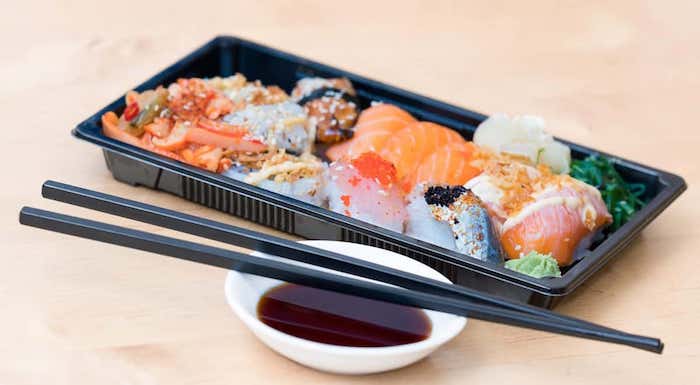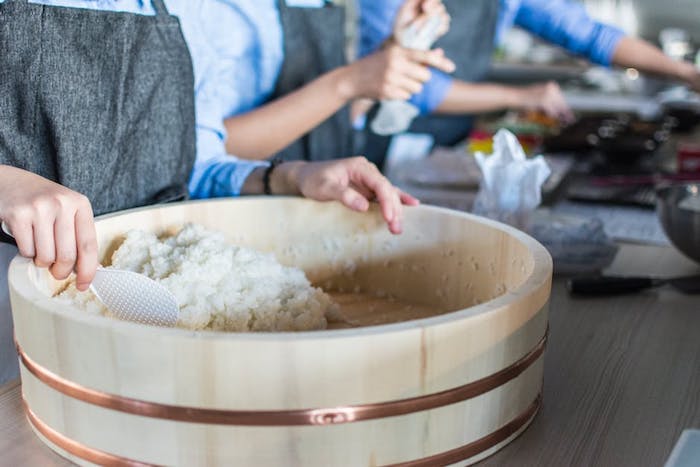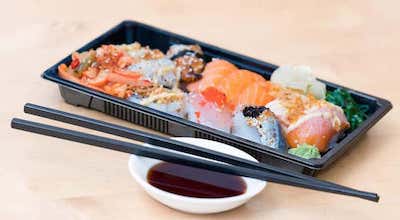We are reader supported. When you purchase through links on our site, we may earn an affiliate commission. Also, as an Amazon affiliate, we earn from qualifying purchases.

If you made more sushi than you thought you could eat, then you are not alone. It happens with me and several other people all the time. So, whether you prepared too many sushi rolls for dinner or some guests failed to turn up due to bad weather, I am sure you would not want to throw away all that extra sushi.
The question is – can you eat sushi the next day? I would say Yes. While it’s recommended to make only as much sushi as you can consume immediately, you can eat the next day if you have to. However, you must store the sushi in the refrigerator within 30 minutes of making to keep the quality intact.
The biggest concern in eating sushi the next day is the fear of food poisoning and the second is loss of texture. Hence, you need to take appropriate measures to ensure that raw fish or seasoned sushi rice do not get contaminated with bacteria.
Loss of texture primarily refers to the hardening of sushi rice when stored inside the refrigerator. The vegetables and fruits used as fillings can also become bland and lose their texture the next day. Read on to find out how to store sushi for best results.
Shelf Life Of Fish Used In Sushi
There is a lot of confusion regarding the shelf life of sushi people buy as takeaway options or prepare at home. Let’s start by telling you sushi is a Japanese delicacy that tastes best when eaten fresh. Although sushi does not mean raw fish, it is an important constituent of the traditional dish.
Many people are so apprehensive about eating raw fish that they keep away from it, fearing that they will fall ill. Raw fish is best when eaten fresh out of the sea but most of the times you will be using/ getting frozen raw fish stored at a temperature that kills bacteria.
Before making sushi, the frozen fish is thawed and it is cut into strips or slices to be used in nigirizushi or maki rolls. Thawed fish should be eaten immediately for best results, however, it can be kept in the refrigerator for 2 days before eating. So, the raw fish in sushi should be fine the next day if you refrigerate the leftover sushi immediately.
Please bear in the mind that not all sushi contains raw fish and there are some varieties that may include cooked, smoked, or fried fish. Seafood like crabs, prawns, and octopus may also be cooked, steamed or fried before using. As a result, they are not prone to bacterial contamination and have a longer shelf life.
Even if the fish is cooked, you must eat it within 3 days after it was prepared. The quality deteriorates very fast after that as the moisture is lost and the meat becomes bland.
Shelf Life Of Sushi Rice

Sushi rice is another important component of the Japanese delicacy and it forms the base of the dish. To make perfect rice, you must boil short-grain Japanese rice like this and then season it with vinegar, sugar, and salt. The sushi rice is applied over the Nori sheet for rolls or formed into an oval shape for nigiri.
As the rice is seasoned with vinegar, it helps in increasing the shelf life of rice. However, in a hot and humid climate, rice tends to get spoiled quickly. When perfectly cooked and seasoned, the sushi rice looks glossy and glutinous. Frozen rice when kept outside for consumption, look sweaty as it comes back to normal temperature.
Although sushi rice can be stored in the refrigerator for the next day, it tends to lose moisture and become hard. As a result, you can no more feel the soft texture and it becomes chewy. To prevent this, I recommend that you cover the sushi with a moist or damp towel to prevent moisture loss.
Many people do not like the taste of sushi the next day because of hardened rice and soggy vegetables. The Japanese delicacy tastes best when the rice is at room temperature so I suggest microwaving the sushi for just 30 seconds to restore some of the lost texture and make it more eatable.
If you have leftover sushi rice from last night, you may cover it up in a foil paper and store inside the refrigerator. However, make sure you use it the next day to prevent falling sick.
The Right Method To Store Your Leftover Sushi
Restaurants don’t usually allow customers to take leftover sushi because they are aware of the risks associated with consuming raw fish after a specific period. However, if you take away a sushi order or make them at home, follow the right measures to store them properly.
While the Styrofoam box used in restaurants work fine, I recommend storing them in an airtight container or plastic wrap to prevent loss of moisture. When wrapping the sushi pieces in a plastic sheet, make sure there’s no excess moisture as this can cause a breeding ground for bacteria.
The correct temperature is also essential to maintain the quality of sushi rice. You must refrigerate at 41ºF (or 5ºC) to make sure the rice does not go bad.
If you have bought sushi from the grocery store, make sure you pay attention to the expiry date mentioned on the cover. If the date has passed, you should not consume it the next day no matter how good it appears from the outside.
Signs That Tell Your Sushi Has Gone Bad
Let’s say you went out for a sushi dinner or bought a takeaway from a supermarket. It’s fine to take the leftovers home and refrigerate to eat them the next day. They are your favorite sushi roll after all! If there is raw fish, make sure you refrigerate only up to 24 hours.
Even though the taste and texture will undergo a huge change and will not be the same as you had when it was fresh, there’s no harm. You can safely consume the sushi 24 hours after it was made provided it was stored in a refrigerator.
Just remember to never leave your sushi outside because bacterial quickly grow on raw meat. There might be situations when you have sushi stored inside the refrigerator but you realize that it’s been sitting there for a little more than 24 hours. So, how to tell whether it’s gone bad or still good to eat? Here are some signs that tell whether your sushi has gone bad.
First, you need to take a note of the smell. If the fish smells fishy or a little off, you should better throw it away than risk your health. At times, your sushi may take up foreign smell of the refrigerator. This can spoil the overall taste of the sushi
The second important thing to consider is the color of sushi and if it looks different from what you remember or the usual color then toss it out of the window. It could be that the fish becomes slimy or gets mold that results in a change of color.
If the Nori or vegetables used in the sushi also do not appear as usual, it is better to just throw it out. If there are fruits used as fillings in the sushi, they may become oxidized and change color if kept outside for long.
5 Tips To Keep Your Sushi Good For Next Day
- If you are hosting a sushi party or preparing a sushi dinner, consider using cooked, smoked, or fried fish to keep your sushi good for the next day.
- When seasoning sushi rice, add some extra vinegar to make the rice extra moist. It will also retain the texture of the rice for longer.
- If you are using avocados as fillings, sprinkle some lemon juice on it to prevent them from turning brown.
- When making sushi for dinner, try to roll only as much as needed so that you can store the ingredients separately in the refrigerator. You can roll them in a fresh nori sheet when ready to eat. This will at least save the Nori from becoming soggy.
- Wrap the leftover sushi pieces in a moist towel and put it inside an airtight container when storing sushi inside the refrigerator. This will prevent the rice from hardening too much.
Related Questions
Can I eat store bought sushi the next day?
Store bought sushi will have an expiry date printed on the package. Make sure you don’t eat that sushi if the expiry date has passed. In general, raw fish is safe to eat for 3 days if refrigerated and sushi containing cooked vegetables or fish can be eaten for an entire week if stored below 41º F.
Can I make sushi the night before?
If you like to have sushi for breakfast but don’t have a lot of time for cooking in the morning, you may make them the night before. Keep them chilled until you are ready to eat. Remove the plastic wrap and you are ready to go.
Is homemade sushi safe to eat the next day?
I think it is comparatively safer to eat homemade sushi the next day than the store bought one. While at home, you can make sure that you transfer the leftovers or extra sushi pieces into the refrigerator immediately.

